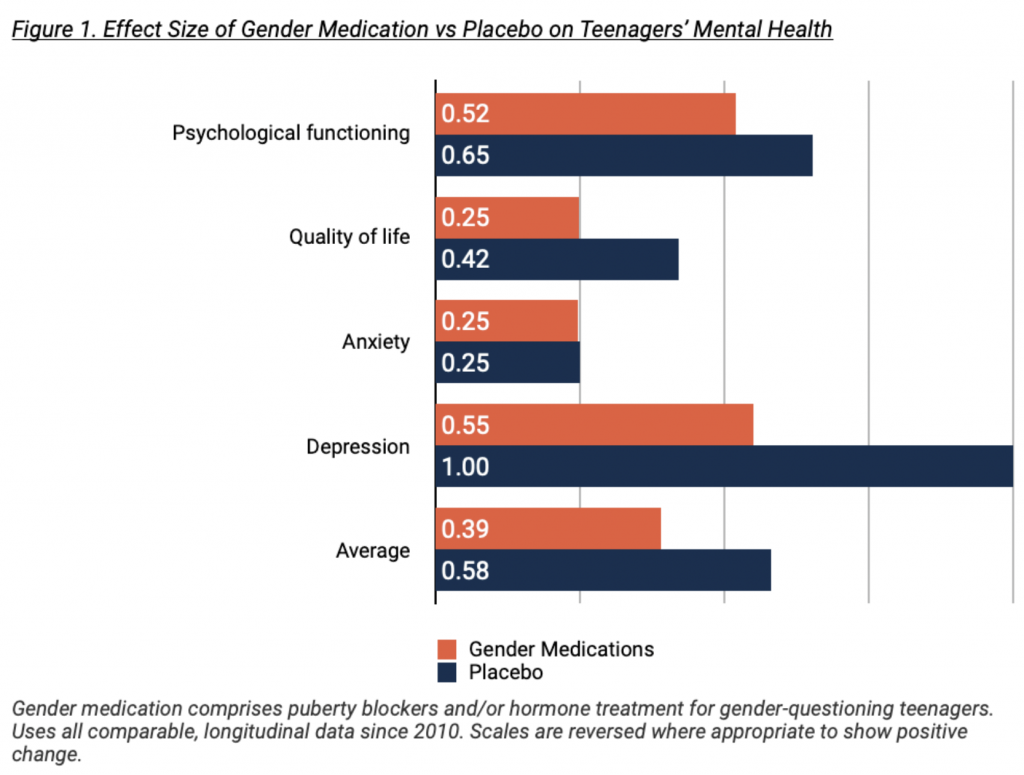
Gender medication is no better than placebo for teenagers’ mental health
Embargoed until midnight on Wednesday 14th December 2022
Gender medication does no more to improve teenagers’ mental health than taking a placebo pill, according to a new study comparing puberty blockers and hormone treatment with trials of mental-health treatments.
The new study finds that, despite puberty blockers and cross-sex hormones often being given to gender-questioning teenagers in response to mental distress, the mental-health benefits are minimal. Meanwhile the medication causes potentially irreversible physical harm, including infertility, impaired sexual function and worse bone health.
Matilda Gosling, the study’s author, says: “This study shows that the gender-affirmative medical model for teenagers is based on faulty assumptions, and may do more harm than good.”
There are no studies comparing gender medication and placebo treatment directly. Gosling therefore analysed placebo data from comparable studies. These were trials assessing medication prescribed for mental-health conditions, such as depression, irritability, schizophrenia and generalised anxiety disorder, that sought to separate the effects of the medication from the placebo effect.
Gosling found that gender medication did no better than the placebo effect in improving general psychological functioning, quality of life, anxiety and depression. In fact, the headline data suggests that taking a placebo is more beneficial for teenagers’ mental health than taking gender medication. But without having access to the original data from all the studies used for the comparison, this cannot be stated categorically.

Gosling says: “The physical harm caused by medical treatment for gender dysphoria means that its mental-health benefits should be substantially better than the placebo effect if it is to be prescribed to teenagers. But the best analysis we have suggests that it’s no better than placebo, and potentially even worse. This research is the latest work to demonstrate the exceptionally poor quality of the evidence base underpinning medical treatment for gender-distressed teenagers.”
She adds: “I hope this initial assessment of the available data will prompt a full, peer-reviewed meta analysis by a team of academic researchers.”
Dr Alison Clayton, psychiatrist and author of a peer-reviewed paper explaining why the field of gender medication provides the perfect storm environment for the placebo effect, has provided independent comment on the latest research. She says: “Ms Gosling’s research addresses a hitherto largely neglected topic – the role of the placebo effect in the reported mental-health improvements experienced by youth with gender dysphoria following treatment with puberty blockers and/or hormones. Her paper serves as an important alert to clinicians, researchers and policy-makers of the need, as a matter of urgency (given the adverse risk profile of these treatments), for more awareness of the placebo effect’s role and it should stimulate much thoughtful discussion about the best way forward to advance research and clinical practice in this area of medicine.”
Notes to editors
- There are eight quantitative, longitudinal studies looking at gender medication in teenagers that report mental-health measures at the start and end of treatment that fit the criteria for inclusion in this study. A ninth study was excluded because it did not separate medication from surgery, and because it included data already covered in another study.
- Comparison studies consist of randomised controlled trials (RCTs) published since 2010 of mental-health medications in teenagers that compare treatment with placebo. Studies were included when they included the same mental-health measures, in the form of standardised assessment scales, as the ones used in the gender medication studies.
- Cohen’s d was used to calculate within-group effect sizes for gender medication and placebo. An accompanying technical paper describes the approach in full.
- Although the graph shows a higher effect size for placebo than for gender medication, we cannot say for certain that the placebo effect on mental health is higher than the effect of gender medication. The difference may be due to chance. Data in these studies is reported at an aggregate level, and we would need data on individuals to allow us to calculate whether there is a statistically significant difference between the placebo effect and the effect of gender medication on teenagers’ mental health.
- Peer-reviewed research papers on gender medication often report uncritically that puberty blockers and hormone treatment have a strong, positive effect on mental health. This claim is repeated by studies of these studies, with no critical reflection on the poor quality of the underlying evidence.
- This analysis was done as part of work to inform a series of papers for the not-for-profit advocacy organisation Sex Matters, and will eventually inform a book chapter being written by the author. This work has not yet been peer reviewed. The peer review process takes months, if not years, and it is important to get this information into the public domain quickly. In the meantime, the approach has been discussed and checked with academic colleagues. Several versions of the analysis were run to check that the findings hold under different conditions, which they do.
- The author is Matilda Gosling, a social researcher and writer specialising in research on issues affecting children and young people. She has worked for governments, charities, foundations and private sector organisations internationally, and has overseen field research in more than 60 countries. She has led quantitative research projects for dozens of clients and is familiar with a broad range of statistical analysis approaches. Matilda is in the process of writing two evidence-based parenting books. She has degrees from the University of Cambridge and the London School of Economics. She is a Certified Member of the Market Research Society, a Member of the Social Research Association and a Fellow of the Royal Society of Arts.
- Sex Matters is a UK-based not-for-profit organisation. It has a singular mission: to re-establish that sex matters in rules, laws, policies, language and culture to protect everybody’s human rights. It campaigns, advocates and produces resources to promote clarity about sex in law, policy and institutions.
